- Home
- Milan Kundera
Laughable Loves
Laughable Loves Read online
Laughable Loves
Milan Kundera
ISBN:0-06-099703-6
This translation was first published in 1974, revised by the author in 1987, and in 1999 once again revised, more extensively, by Aaron Asher in collaboration with the author.
Milan Kundera is a master of graceful illusion and illuminating surprise. In one of these stories a young man and his girlfriend pretend that she is a stranger he picked up on the road�only to become strangers to each other in reality as their game proceeds. In another a teacher fakes piety in order to seduce a devout girl, then jilts her and yearns for God. In yet another girls wait in bars, on beaches, and on station platforms for the same lover, a middle-aged Don Juan who has gone home to his wife. Games, fantasies, and schemes abound in all the stories while different characters react in varying ways to the sudden release of erotic impulses.
"Light, wry, and wise."
�John Skow, Time
"An intellectual heavyweight and a pure literary virtuoso, Milan Kundera takes some of Freud's most cherished complexes and irreverently whirls them about in acts of legerdemain that capture our darkest, deepest human passions. . . . The tales in Laughable Loves surprise and illuminate. . . . Kundera's world is complex, full of mockeries and paradoxes. Life is often brutal and humiliating; it is often blasphemous, funny, irritating."
�Abe Ravitz, Cleveland Plain Dealer
"Milan Kundera offers a very special blend of sympathy and cynicism, irony and affability, that is unmatched in our literature."
�Thomas Joyce, Chicago Sun-Times
The Franco-Czech novelist Milan Kundera was born in Brno and has lived in France, his second homeland, for more than twenty years. He is the author of the novels The Joke, Life Is Elsewhere, Farewell Waltz, The Book of Laughter and Forgetting, The Unbearable Lightness of Being, and Immortality, and the short story collection Laughable Loves�all written originally in Czech. His most recent novels, Slowness and Identity, as well as his nonfiction works, The Art of the Novel and Testaments Betrayed, were originally written in French.
BOOKS BY MILAN KUNDERA
The Joke
Laughable Loves
Life Is Elsewhere
Farewell Waltz (EARLIER TRANSLATION: The Farewell Party)
The Book of Laughter and Forgetting
The Unbearable Lightness of Being
Immortality
Slowness
Identity
Jacques and His Master (PLAY)
The Art of the Novel (ESSAY) Testaments Betrayed (essay)
Milan Kundera
Laughable Loves
Translated from the Czech by Suzanne Rappaport
This book was first published in Czechoslovakia under the tide Smesne lasky by Ceskoslovensky Spisovatel, 1969. It was first published in the United States of America by Alfred A. Knopf, Inc., 1974.
LAUGHABLE LOVES. Copyright � 1969, 1987, 1999 by Milan Kundera. English translation copyright � Alfred A. Knopf, Inc., 1974. All rights reserved. Printed in the United States of America.
Library of Congress Cataloging-in-Publicafion Data
Kundera, Milan.
[Smesne lasky English]
Laughable Loves/Milan Kundera. p. cm.
Contents: Nobody will laugh-The golden apple of eternal desire�The hitchhiking game�Symposium�Let the old dead make room for the young dead�Dr. Havel after twenty years�Eduard and God.
ISBN 0-06-099703-6
1. Czech Republic-Social life and customs-Fiction. I. Title. PG5039.21.U6S58413 1999 891.8'6354-dc21
CONTENTS
Nobody Will Laugh - 1
The Golden Apple of Eternal Desire - 47
The Hitchhiking Game - 77
Symposium - 107
Let the Old Dead Make Room
for the Young Dead - 163
Dr. Havel After Twenty Years - 195
Eduard and God - 241
Nobody Will Laugh
1
"Pour me some more slivovitz," said Klara, and I wasn't against it. It was hardly unusual for us to open a bottle, and this time there was a genuine excuse for it: that day I had received a nice fee from an art history review for a long essay.
Publishing the essay hadn't been so easy�what Id written was polemical and controversial. That's why my essay had previously been rejected by Visual Arts, where the editors were old and cautious, and had then finally been published in a less important periodical, where the editors were younger and less reflective.
The mailman brought the payment to me at the university along with another letter, an unimportant letter; in the morning in the first flush of beatitude I had hardly read it. But now, at home, when it was approaching midnight and the bottle was nearly empty, I took it off the table to amuse us.
"Esteemed comrade and�if you will permit the expression�my colleague!" I read aloud to Klara. "Please excuse me, a man whom you have never met, for writing to you. I am turning to you with a request that you read the enclosed article. True, I do not know you, but I respect you as a man whose judgments,
3
Laughable Loves
reflections, and conclusions astonish me by their agreement with the results of my own research; I am completely amazed by it. ..." There followed greater praise of my merits and then a request: Would I kindly write a review of his article�that is, a specialist's evaluation�for Visual Arts, which had been underestimating and rejecting his article for more than six months. People had told him that my opinion would be decisive, so now I had become the writer's only hope, a single light in otherwise total darkness.
We made fun of Mr. Zaturecky, whose aristocratic name fascinated us; but it was just fun, fun that meant no harm, for the praise he had lavished on me, along with the excellent slivovitz, softened me. It softened me so much that in those unforgettable moments I loved the whole world. And because at that moment I didn't have anything to reward the world with, I rewarded Klara. At least with promises.
Klara was a twenty-year-old girl from a good family. What am I saying, from a good family? From an excellent family! Her father had been a bank manager, and around 1950, as a representative of the upper bourgeoisie, was exiled to the village of Celakovice, some distance from Prague. As a result his daughter's party record was bad, and she had to work as a seamstress in a large Prague dressmaking establishment. I was now sitting opposite this beautiful seamstress and trying to make her like me more by telling her lightheartedly about the advantages of a job I'd promised to get her
4
Nobody Will Laugh
through connections. I assured her that it was absurd for such a pretty girl to lose her beauty at a sewing machine, and I decided that she should become a model.
Klara didn't object, and we spent the night in happy understanding.
2
We pass through the present with our eyes blindfolded. We are permitted merely to sense and guess at what we are actually experiencing. Only later when the cloth is untied can we glance at the past and find out what we have experienced and what meaning it has.
That evening I thought I was drinking to my successes and didn't in the least suspect that it was the prelude to my undoing.
And because I didn't suspect anything I woke up the next day in a good mood, and while Klara was still breathing contentedly by my side, I took the article, which was attached to the letter, and skimmed through it with amused indifference.
It was called "Mikolas Ales, Master of Czech Drawing," and it really wasn't worth even the half hour of inattention I devoted to it. It was a collection of platitudes
5
Laughable Loves
jumbled together with no
sense of continuity and without the least intention of advancing through them some original thought.
Quite clearly it was pure nonsense. The very same day Dr. Kalousek, the editor of Visual Arts (in other respects an unusually unpleasant man), confirmed my opinion over the telephone; he called me at the university: "Say, did you get that treatise from the Zaturecky guy? Then review it. Five lecturers have already cut him to pieces, but he keeps on bugging us; he's got it into his head that you're the only genuine authority. Say in two sentences that it's crap; you know how to do that, you know how to be really venomous; and then we'll all have some peace."
But something inside me protested: why should I have to be Mr. Zaturecky's executioner? Was I the one receiving an editor's salary for this? Besides, I remembered very well that they had refused my essay at Visual Arts out of overcautiousness; what's more, Mr. Zaturecky's name was firmly connected in my mind with Klara, slivovitz, and a beautiful evening. And finally, I won't deny it, it's human�I could have counted on one finger the people who think me "a genuine authority": why should I lose this only one?
I closed the conversation with some clever vaguery, which Kalousek considered a promise and I an excuse. I put down the receiver firmly convinced that I would never write the piece on Mr. Zaturecky's article.
Instead I took some paper out of the drawer and wrote a letter to Mr. Zaturecky, in which I avoided any
6
Nobody Will Laugh
kind of judgment of his work, excusing myself by saying that my opinions on nineteenth-century art were commonly considered devious and eccentric, and therefore my intercession�especially with the editors of Visual Arts�would harm rather than benefit his cause. At the same time I overwhelmed Mr. Zaturecky with friendly loquacity, from which it was impossible not to detect sympathy on my part.
As soon as I had put the letter in the mailbox I forgot Mr. Zaturecky. But Mr. Zaturecky did not forget me.
3
One day when I was about to end my lecture�I am an art history lecturer at the university�there was a knock at the door; it was our secretary, Marie, a kind elderly lady who occasionally prepares coffee for me and says I'm out when there are undesirable female voices on the telephone. She put her head in the doorway and said that a gentleman was looking for me.
I'm not afraid of gentlemen, and so I took leave of the students and went good-humoredly out into the corridor. A smallish man in a shabby black suit and a white shirt bowed to me. He very respectfully informed me that he was Zaturecky.
I invited the visitor into an empty room, offered him
7
Laughable Loves
a chair, and began pleasantly discussing everything possible with him, for instance what a bad summer it was and what exhibitions were on in Prague. Mr. Zaturecky politely agreed with all my chatter, but he soon tried to apply every remark of mine to his article, which lay invisibly between us like an irresistible magnet.
"Nothing would make me happier than to write a review of your work," I said finally, "but as I explained to you in the letter, I am not considered an expert on the Czech nineteenth century, and in addition I'm on bad terms with the editors of Visual Arts, who take me for a hardened modernist, so a positive review from me could only harm you."
"Oh, you're too modest," said Mr. Zaturecky. "How can you, who are such an expert, judge your own standing so blackly! In the editorial office they told me that everything depends on your review. If you support my article they'll publish it. You're my only recourse. It's the work of three years of study and three years of toil. Everything is now in your hands."
How carelessly and from what bad masonry does a man build his excuses! I didn't know how to answer Mr. Zaturecky. I involuntarily looked at his face and noticed there not only small, ancient, and innocent spectacles staring at me, but also a powerful, deep vertical wrinkle on his forehead. In a brief moment of clairvoyance a shiver shot down my spine: This wrinkle, concentrated and stubborn, betrayed not only the intellectual torment its owner had gone through over Mikolas Ales's drawings, but also unusually strong
8
Nobody Will Laugh
willpower. I lost my presence of mind and failed to find any clever excuse. I knew that I wouldn't write the review, but I also knew that I didn't have the strength to say so to this pathetic little man's face.
And then I began to smile and make vague promises. Mr. Zaturecky thanked me and said that he would come again soon. We parted smiling.
In a couple of days he did come. I cleverly avoided him, but the next day I was told that he was searching for me again at the university. I realized that bad times were on the way. I went quickly to Marie so as to take appropriate steps.
"Marie dear, I beg you, if that man should come looking for me again, say that I've gone to do some research in Germany and I'll be back in a month. And you should know about this: I have, as you know, all my lectures on Tuesday and Wednesday. I'll shift them secretly to Thursday and Friday. Only the students will know about this. Don't tell anyone, and leave the schedule uncorrected. I'll have to go underground."
4
In fact Mr. Zaturecky did soon come back to look me up and was miserable when the secretary informed him that I'd suddenly gone off to Germany. "But this is not
9
Laughable Loves
possible. The lecturer has to write a review about me. How could he go away like this?" "I don't know," said Marie. "However, he'll be back in a month." "Another
month . . . ," moaned Mr. Zaturecky: "And you don't know his address in Germany?" "I don't," said Marie.
And then I had a month of peace.
But the month passed more quickly than I expected, and Mr. Zaturecky stood once again in the office. "No, he still hasn't returned," said Marie, and when she met me later about something she asked me imploringly: "Your little man was here again, what in heaven's name should I tell him?" "Tell him, Marie, that I got jaundice and I'm in the hospital in Jena." "In the hospital!" cried Mr. Zaturecky, when Marie told him the story a few days later. "It's not possible 1 Don't you know that the lecturer has to write a review about me!" "Mr. Zaturecky," said the secretary reproachfully, "the lecturer is lying in a hospital somewhere abroad seriously ill, and you think only about your review." Mr. Zaturecky backed down and went away, but two weeks later he was once again in the office: "I sent a registered letter to the lecturer at the hospital in Jena. The letter came back to me!" "Your little man is driving me crazy," said Marie to me the next day. "You mustn't get angry with me, but what could I say? I told him that you've come back. You have to deal with him yourself now."
I didn't get angry with Marie. She had done what she could. Besides, I was far from considering myself beaten. I knew that I was not to be caught. I lived undercover
10
Nobody Will Laugh
all the time. I lectured secretly on Thursday and Friday, and every Tuesday and Wednesday, crouching in the doorway of a house opposite the art history faculty, I would rejoice at the sight of Mr. Zaturecky, who kept watch outside the faculty building waiting for me to come out. I longed to put on a bowler hat and a false beard. I felt like Sherlock Holmes, like Mr. Hyde, like the Invisible Man wending his way through the city; I felt like a little boy.
One day, however, Mr. Zaturecky finally got tired of keeping watch and pounced on Marie. "Where exactly does Comrade Lecturer lecture?"
"There's the schedule," said Marie, pointing to the wall, where the times of all the lectures were laid out in exemplary fashion in a large grid.
"I see that," said Mr. Zaturecky, refusing to be put off. "Only Comrade Lecturer never lectures here on either Tuesday or Wednesday. Does he call in sick?"
"No," said Marie hesitantly.
And then the little man turned again on Marie. He reproached her for the confusion in the schedule. He inquired ironically how it was that she didn't know where every teacher was at a given time. He told her that he was going to complain about her.
He shouted. He said that he was also going to complain about Comrade Lecturer, who wasn't lecturing, although he was supposed to be. He asked if the dean was in.
Unfortunately the dean was in.
Mr. Zaturecky knocked on his door and went in. Ten
11
Laughable Loves
minutes later he returned to Marie's office and demanded my address.
"Twenty Skalnikova Street, in Litomysl," said Marie.
"Litomysl?"
"The lecturer has only a temporary address in Prague, and he doesn't want it disclosed�"
"I'm asking you to give me the address of the lecturer's Prague apartment," cried the little man in a trembling voice.
Somehow Marie lost her presence of mind. She gave him the address of my attic, my poor little refuge, my sweet den, in which I would be caught.
5
Yes, my permanent address is in Litomysl; there I have my mother and memories of my father; I flee from Prague as often as I can and write at home in my mother's small apartment. So it happened that I kept my mother's apartment as my permanent residence and in Prague didn't manage to get myself a proper bachelor apartment, as you're supposed to, but lived in lodgings, in a small, completely private attic, whose existence I concealed as much as possible in order to pre-
12
Nobody Will Laugh
vent unnecessary meetings between undesirable guests and my transient female visitors.
For precisely these reasons I didn't enjoy the best reputation in the house. Also, during my stays in Litomysl I had several times lent my cozy little room to friends, who amused themselves only too well there, not allowing anyone in the house to get a wink of sleep. All this scandalized some of the tenants, who conducted a quiet war against me. Sometimes they had the local committee express unfavorable opinions of me, and they even handed in a complaint to the housing department.
At that time it was inconvenient for Klara to get to work from such a distance as Celakovice, and so she began to stay overnight at my place. At first she stayed timidly and as an exception, then she left one dress, then several dresses, and within a short time my two suits were crammed into a corner of the wardrobe, and my little room was transformed into a woman's boudoir.
I really liked Klara; she was beautiful; it pleased me that people turned their heads when we went out together; she was at least thirteen years younger than me, which increased the students' respect for me; I had a thousand reasons for taking good care of her. But I didn't want it to be known that she was living with me. I was afraid of rumors and gossip about us in the house; I was afraid that someone would start attacking my good old landlord, who was discreet and didn't concern himself about me; I was afraid that one day he would come to me, unhappy and with a heavy heart, and ask me to
13
Laughable Loves
send the young lady away for the sake of his good name.
Klara had strict orders not to open the door to anyone.
One day she was alone in the house. It was a sunny day and rather stuffy in the attic. She was lounging almost naked on my couch, occupying herself with an examination of the ceiling.

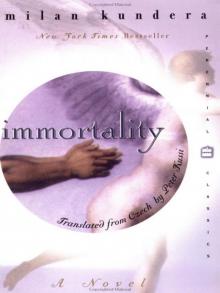 Immortality
Immortality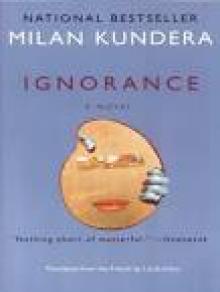 Dr. Havel After Twenty Years
Dr. Havel After Twenty Years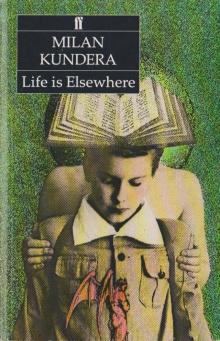 Life Is Elsewhere
Life Is Elsewhere Laughable Loves
Laughable Loves Symposium
Symposium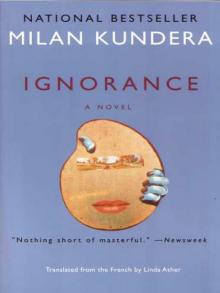 Ignorance
Ignorance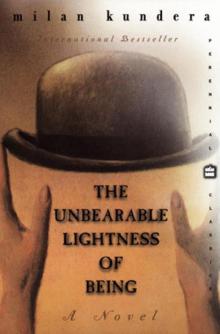 The Unbearable Lightness of Being
The Unbearable Lightness of Being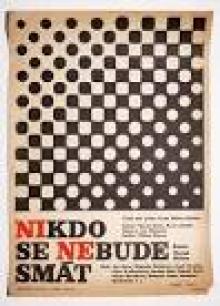 Nobody Will Laugh
Nobody Will Laugh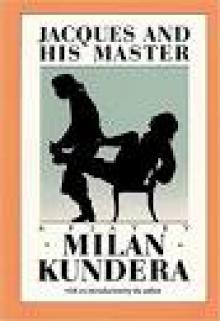 Jacques and His Master: An Homage to Diderot in Three Acts
Jacques and His Master: An Homage to Diderot in Three Acts The Golden Apple of Eternal Desire
The Golden Apple of Eternal Desire Eduard & God
Eduard & God Slowness
Slowness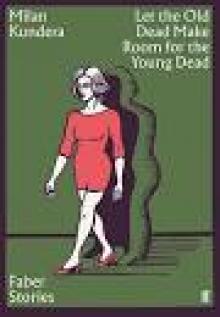 Let the Old Dead Make Room for the New Dead
Let the Old Dead Make Room for the New Dead Farewell Waltz
Farewell Waltz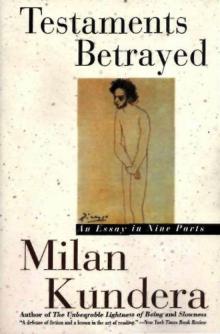 Testaments Betrayed: An Essay in Nine Parts
Testaments Betrayed: An Essay in Nine Parts